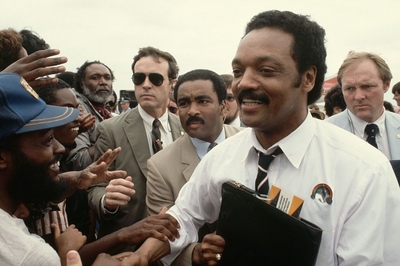WE ARE called the Second Generation – the children of the survivors of the Holocaust.
In the spring of 1939, nearly 9 million Jews lived in Europe. By the spring of 1946, two-thirds of them were dead. The German Nazis had lost the war against the Allies. But they and their collaborators had won the war against European Jewry.
Any European Jew alive in 1946 may be said to have survived the Holocaust — those who were able to flee, to America or to Russia; those who concealed themselves in forests; those who disguised themselves as Gentiles; those who lived out the war by hiding in attics, cellars, and secret rooms. Each suffered profoundly, living daily in the knowledge that only one misstep stood between him and the Final Solution.
But when we speak of "Holocaust survivors," we are speaking especially of those who survived the concentration camps. There were fewer than 75,000 survivors of those death camps. One of them was my father.
 Presidential candidate Jesse Jackson: "I am sick and tired of hearing about the Holocaust." |
None of us can know what precisely it is to be a Holocaust survivor. How, after all, do you calibrate the agony of a person who has been put through the most unspeakable horror in the bitter chronicle of human misery?
On Yom Hashoah — the annual Holocaust Remembrance Day, which this year falls on Sunday, April 29 — we weep for the slaughtered Six Million; we honor those few survivors who are yet alive.
The Germans who in April 1944 tattooed my father at Auschwitz — a blue-green A-10502 on his left arm — did not intend for him to survive until April 1984. They assuredly did not intend for him to raise children. Instead of the Second Generation, there was to have been only the historical recollection of the final generation.
For survivors there is no task more sacred than keeping alive the memory of what they endured. Nothing can shield us from a new Auschwitz except our undiminished revulsion at the old Auschwitz. Sustaining that emotion is a wearying struggle, and the struggle naught availeth. Consider:
- At Northwestern University, a professor named Arthur Butz publishes a book labeling the Holocaust "The Myth of the Twentieth Century."
- The Encyclopaedia Britannica not only has no article on the Holocaust, nor one for Buchenwald or Treblinka, but its discussion of "genocide" does not mention the words Jew" or Nazi."
- The Institute for Historical Review exists for the purpose of "proving" there was no Holocaust, no gas chambers, no crematoriums — that photographs of concentration camps were faked — that it is all a concoction of Zionist propaganda.
- The first serious black candidate for president of the Ünited States announces: "I am sick and tired of hearing about the Holocaust.... We have to get on with the issues of today and not talk about the Holocaust." His most flamboyant promoter, black Muslim leader Louis Farrakhan, broadcasts over the airwaves his conviction that "Hitler was a very great man."
Something is appallingly wrong. The most unspeakable horror in the bitter lesson of the Holocaust — that the horrifyingly impossible is always possible — is not only forgotten, but degraded. This is a trend that must be stopped. The Nazis' Final Solution murdered my father's family, and all but murdered him. If his ordeal is not to be stripped of its meaning, then let us vehemently reject the Arthur Butzes and the Jesse Jacksons and their debasement of the Holocaust. Let us keep strong the passion underlying the vow: "Never again."
On Yom Hashoaa, let us remember.
Jeff Jacoby is an attorney in Cleveland, Ohio.

